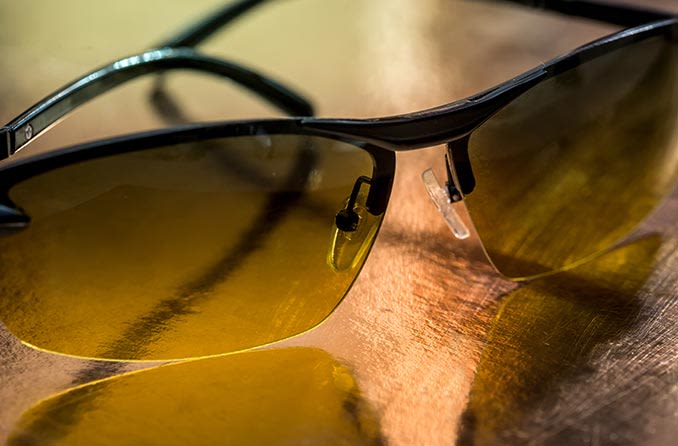Night driving glasses: Do anti-glare glasses work at night?

Not seeing clearly when driving at night is a common complaint. Poor night vision can affect people of any age, but it tends to be particularly bothersome after age 40.
Maybe you've seen or heard of special eyeglasses with tinted lenses that are supposed to help you see better for night driving.
But do these "night driving glasses" really work? Read on to find out.
What are night driving glasses?
"Night driving glasses" typically are non-prescription eyeglasses that feature yellow tinted lenses. Essentially, they are the same thing as a type of sports eyewear known as "shooter's glasses" that have been around for many years.
Night driving glasses typically will also include anti-reflective coating to eliminate internal reflections of light from streetlights and oncoming headlights that can cause glare.
Many hunters (and people who wear yellow tinted glasses for other sports) find shooter's glasses increase contrast of objects against an overcast sky. This makes the glasses especially popular among bird hunters.
But do they help you see better when driving at night?
Why night driving glasses might be a bad idea
Glasses with yellow-tinted lenses do indeed enhance contrast in certain daylight conditions. This is because the yellow tint blocks some blue light from sunlight. Blue light comprises the portion of the visible light spectrum that has the highest energy and shortest wavelengths.
This high-energy visible (HEV) blue light also is more likely to cause glare when it enters the eye, compared with other visible light that has longer wavelengths.
The "blue blocking" filtration provided by yellow tinted lenses also occurs with amber and copper-coloured lenses. In fact, these darker tints can block significantly more blue light than yellow lenses — but they also prevent more light from entering the eye, which reduces visibility in low-light conditions.
In fact, even yellow lenses reduce overall visible light to some degree by blocking a portion of the HEV blue light rays. This may be a good thing for visibility in daylight, but not at night.
Research shows no benefit
Researchers at the Schepens Eye Research Institute (affiliated with Harvard Medical School) in Boston recently conducted a study to determine whether night driving glasses provide any visual benefit in simulated nighttime driving conditions.
A total of 22 adults in a wide range of ages participated in the study published in 2019. All participants "drove" in four simulated night-driving conditions, wearing either yellow-tinted night driving glasses or glasses with clear lenses.
Also, each participant drove in scenarios with and without a headlight glare simulator employed to mimic the effect of oncoming traffic.
In each scenario, the participants' reaction time to seeing a pedestrian walking alongside the simulated roadway was measured.
The study found that night driving glasses did not appear to improve pedestrian detection at night or reduce the negative effects of headlight glare on pedestrian detection performance.
“Our data suggest that wearing yellow lens glasses when driving at night does not improve performance in the most critical task: detection of pedestrians,” the study authors said.
“Instead, the data showed that wearing yellow lens glasses may slightly worsen performance, although that finding was not statistically significant.
"These findings do not appear to support having eye care professionals advise patients to use yellow-lens night-driving glasses," they concluded.
ARE NIGHT DRIVING GLASSES RIGHT FOR YOU? Find an optician near you and schedule an appointment.
Best glasses for night driving
For the best night driving vision possible, start by seeing an optician near you for a comprehensive eye exam.
Many people who think they see "just fine" are surprised when they find out how much clearer they can see at night when even a small amount of uncorrected refractive error is corrected with new glasses.
If your eyes are healthy and you have no refractive errors that need correction with prescription glasses, then the best glasses for night driving for you are: No glasses at all!
On the other hand, if you need prescription eyeglasses because you have shortsightedness, long sightedness or astigmatism, choose clear corrective lenses with anti-reflective coating. These lenses will allow nearly 100% of visible light to enter your eye and be properly focused for the best vision possible.
Also, the anti-reflective (AR) coating eliminates internal reflections of streetlights and oncoming headlights in your lenses, which can be sources of glare.
Sometimes, people wonder if they should purchase glasses with clear lenses and AR coating for night driving even if they have no need for vision correction. Don't waste your money — AR coating only reduces glare caused by the lenses themselves.
If you don't need corrective lenses, you won't get any visual benefit from nonprescription lenses with AR coating.
Comparison of pedestrian detection with and without yellow-lens Glasses during simulated night driving with and without headlight glare. JAMA Ophthalmology. August 1, 2019. [Online ahead of print.]
Yellow lens glasses do not improve night driving. Ocular Surgery News. August 1, 2019.
Page published on Tuesday, 28 July, 2020





